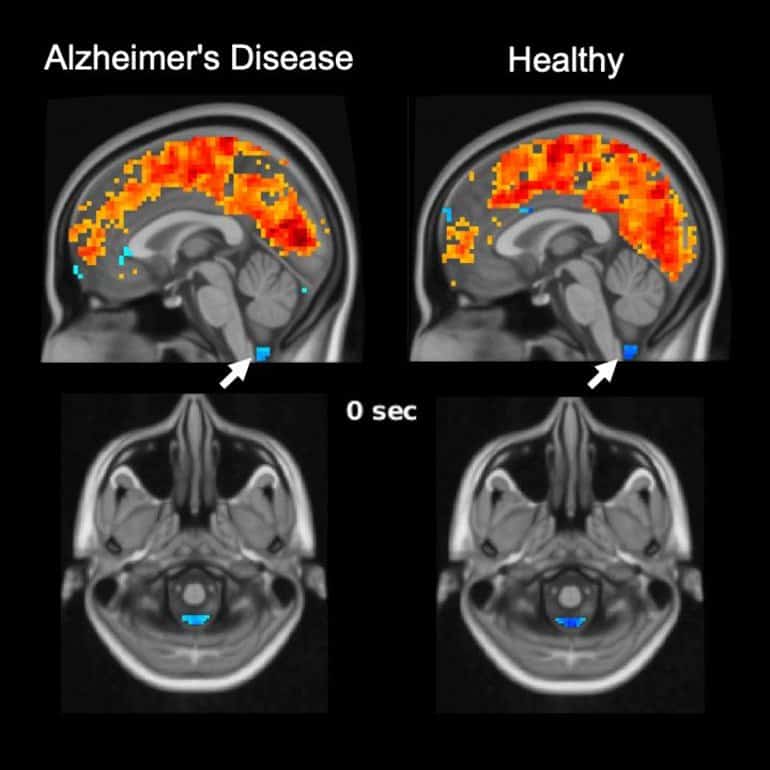Summary: The connection between brain activity during sleep and cerebrospinal fluid flow was reduced in those with risk factors for dementia and those with Alzheimer’s disease than in the healthy control group.
Source: PLOS
Evidence of sleep-dependent low-frequency (<0.1 Hz) global brain activity in the clearance of Alzheimer’s disease-related toxin buildup is presented in research published on 1st June 2021 in the open access journal PLOS Biology by Xiao Liu and colleagues at The Pennsylvania State University.
This neuronal activity was more strongly linked with cerebrospinal fluid flow in healthy controls than higher risk groups and patients, and the findings could serve as a potential imaging marker for clinicians in evaluating patients.
The development of Alzheimer’s disease is believed to be driven by the buildup of the toxic proteins amyloid-β and tau in the brain. The brain’s glymphatic system plays a crucial role in clearing these toxins and previous work has shown a possible relationship between sleep-dependent global brain activity and the glymphatic system by showing this activity is coupled by cerebrospinal fluid flow essential for the glymphatic system.
Using 118 subjects in the Alzheimer’s Disease Neuroimaging Initiative project, the researchers measured this global brain activity and cerebrospinal fluid flow as well as looking at behavioral data. Individuals underwent resting-state fMRI sessions two years apart, and the team compared their findings with neurobiological and neuropsychological markers related to Alzheimer’s disease, such as levels of the toxic protein amyloid-β.
The strength of the connection between brain activity and cerebrospinal fluid flow was weaker in individuals at a higher risk or who had already developed Alzheimer’s disease. Additionally, this weaker connection was associated with higher levels of amyloid-β and disease-related behavioral measures two years later.

This suggests an important role for sleep-dependent global brain activity in the clearance of brain waste, and its connection to cerebrospinal fluid flow could be helpful as a future marker for clinical evaluation.
Dr. Liu adds, “The study linked the coupling between the resting-state global brain activity and cerebrospinal fluid flow to Alzheimer’s disease pathology. The finding highlights the potential role of low-frequency (<0.1 Hz) resting-state neural and physiological dynamics in the neurodegenerative diseases, presumably due to their sleep-dependent driving of cerebrospinal fluid flow to wash out brain toxins.
“Future studies are warranted to fully understand the global brain activity and associated physiological modulations and their role in glymphatic clearance and neurodegenerative diseases.”
About this sleep and Alzheimer’s disease research news
Source: PLOS
Contact: Xiao Liu – PLOS
Image: The image is credited to Feng Han and Xiao Liu @ The Pennsylvania State University
Original Research: Open access.
“Reduced coupling between cerebrospinal fluid flow and global brain activity is linked to Alzheimer disease-related pathology” by Han F, Chen J, Belkin-Rosen A, Gu Y, Luo L, Buxton OM, et al. PLOS Biology
Abstract
Reduced coupling between cerebrospinal fluid flow and global brain activity is linked to Alzheimer disease-related pathology
The glymphatic system plays an important role in clearing the amyloid-β (Aβ) and tau proteins that are closely linked to Alzheimer disease (AD) pathology. Glymphatic clearance, as well as Aβ accumulation, is highly dependent on sleep, but the sleep-dependent driving forces behind cerebrospinal fluid (CSF) movements essential to the glymphatic flux remain largely unclear.
Recent studies have reported that widespread, high-amplitude spontaneous brain activations in the drowsy state and during sleep, which are shown as large global signal peaks in resting-state functional magnetic resonance imaging (rsfMRI), are coupled with CSF movements, suggesting their potential link to glymphatic flux and metabolite clearance.
By analyzing multimodal data from the Alzheimer’s Disease Neuroimaging Initiative (ADNI) project, here we showed that the coupling between the global fMRI signal and CSF influx is correlated with AD-related pathology, including various risk factors for AD, the severity of AD-related diseases, the cortical Aβ level, and cognitive decline over a 2-year follow-up.
These results provide critical initial evidence for involvement of sleep-dependent global brain activity, as well as the associated physiological modulations, in the clearance of AD-related brain waste.







